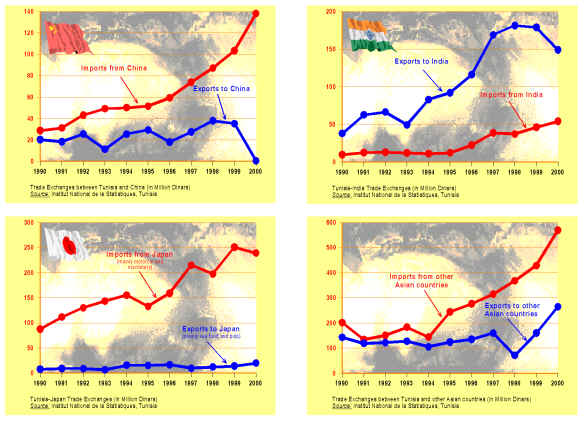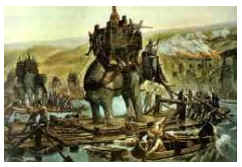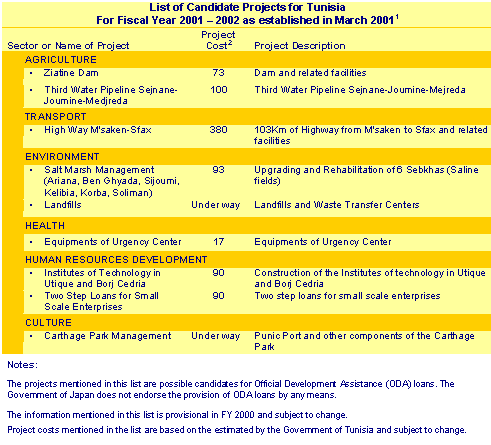Japan-Tunisia: The First Glimmers of Cooperation
First published in the June 2001 Special Edition of
The Economist Maghrébin, pages 10-12
By Mohamed Louadi, PhD
Just as would have put it
a Japanese Press Secretary, since its independence, Tunisia has been pursuing a
very moderate and realistic foreign policy. Even the World Bank would agree that
Tunisia’s economy is well-managed and in good shape and that the domestic
situation is remarkably stable. Moreover, Tunisia is playing an important role
in maintaining peace and stability not only in North Africa but also in the
Middle East.
On the other hand, the effort of strengthening friendly and cooperative ties between Tunisia and Asian countries is significant from both the political and economic perspectives.

But….
Take Japan for instance, a country with which Tunisia has established official diplomatic relationship in June 1956.
The first Japanese to ever have visited Tunisia was a man trading in porcelain, tea, and material. No one knows when he set foot in this country but there are reasons to believe that it was some time between WWI and WWII, a period when Japanese products were easily found in Tunisia. No one knows when the first Tunisian visited Japan, but perhaps was he a Carthaginian.
Then, in the 1930s, the Japanese Ministry of Trade sent special economic missions to prospect in the Maghreb. Then it wasn’t until 1956, when Tunisia gained its independence from colonial France, that Japan was among the first countries to recognize Tunisia as a full-fledge sovereign state. The first Japanese embassy opened its doors in 1959. Tunisia opened its first embassy in Tokyo in 1977 and its first ambassador was then Habib Ben Yahia, widely known as one of the most knowledgeable Tunisian in Japanese culture and history.
Japan Overseas Cooperation Volunteers has started in 1975 and now more than 20 volunteers are acting in many areas in all over Tunisia.
But even in 1998, Japanese residing in Tunisia number little more than 125! Tunisians residing in Japan, mainly students, number in the 150, going to there at the rate of eight per year, thanks to a scholarship granted by the Japanese government. Japanese students on the other hand, are more and more interested in coming to Tunisia to study Arabic at the Institut Bourguiba des Langues Vivantes.
That shows how little is taking place between Japan and Tunisia. Tunisia imports mainly manufactured products such as electric, electronic or automobile machinery. Japan imports from Tunisia fishery products, textiles, etc. Exports amount to 1.84 billion yen (sea food and pulp) and imports to 5.17 billion yen (motorcar and machinery) whereas direct investment from Japan cumulates to $2 million in 1992. Tunisia has also become an annual recipient of yen loans in fiscal 1997 and received 15.8 billion yen in this year. Though Tunisian exports have been on the rise these recent years, they compare little with Japanese imports and the trade balance is not in favor of Tunisia, as shown in the graph above. Other Tunisian products are highly exportable to Japan; olive oil, tuna, anchovies, finished clothing, to name a few.
Over the years, relations between Japan and Tunisia have been
favorably developing, centering on frequent visits by Tunisian leading official
figures, including that of President Zine El Abidine Ben Ali as a state guest in
1996 to confirm and further strengthen those friendly and cooperative relations.
Japan's Economic Cooperation is achieved through grant aids; loans
amount to 124.3 billion yen and grants to 1.5 billion yen whereas technical
cooperation is worth 10.8 billion yen. This followed Japan’s 1997 decision to
place Tunisia among the 14 country towards which yen loans could be extended on
a yearly basis. Tunisia received 15.8 billion yen in 1997 alone. But Japan has
also been cooperating in building of theaters and sports promotion in Tunisia
through Cultural Grants.
Why?
 But
Tunisia-Japan relationship are all but modest. Some attribute the seemingly low
level of interest to the geographic and historical distances between Japan and
Tunisia. Indeed, western companies have been reticent to invest in Africa in
general considering the high level of risks in some countries. Yet, according to
a report published by the United Nations Conference on Trade and Development in
1999, the average return on foreign direct investment in Africa has been higher
than in any other region. Additionally, Tunisia could hardly be compared to some
of the riskier destinations in the rest of the continent. Tunisia has proven
over the past decades that it is a stable and safe country. International rating
agencies granted the country investment grades of BAA3 (Moody’s in 1998), BBB-
(Standard & Poor in 1998), and BBB+ (Japan R&I, July
1998).
But
Tunisia-Japan relationship are all but modest. Some attribute the seemingly low
level of interest to the geographic and historical distances between Japan and
Tunisia. Indeed, western companies have been reticent to invest in Africa in
general considering the high level of risks in some countries. Yet, according to
a report published by the United Nations Conference on Trade and Development in
1999, the average return on foreign direct investment in Africa has been higher
than in any other region. Additionally, Tunisia could hardly be compared to some
of the riskier destinations in the rest of the continent. Tunisia has proven
over the past decades that it is a stable and safe country. International rating
agencies granted the country investment grades of BAA3 (Moody’s in 1998), BBB-
(Standard & Poor in 1998), and BBB+ (Japan R&I, July
1998).
In fact,
the real reasons are to be found elsewhere. No one would argue that the way
Tunisians regard Japan is that of an giant economic and technological
superpower, an image conveyed and reinforced by the Kawazaki, Sony, Suzuki,
Toyota, and Yamaha products. Else, Tunisians know Japan thanks to the martial
arts such as Judo or Karate. If not, it would be through the famous The Bridge
on the River Kwaï (a
non-Japanese film) or, better yet, Clavell’s Shogun, a fantastic series shown a
few month ago on TV. Some movie buffs would have known Akira Kurosawa’s
masterpieces, but those are the very few.
 How do
average Japanese see Tunisia? I don’t think they do. With the notable exception
of visitors, such as HE Prince Takamado, M. Mori, ex-Prime Minister of Japan, M.
Eto, ex-Minister of Foreign Affairs, M. Araki, Vice-Minister of Foreign Affairs,
and a few academics, Japanese do
not even know where Tunisia is located geographically, that, if in fact, they
recognize the name. A few would remember their history courses and make the link
between present-day Tunisia and Antique Carthage. But that would be about
all.
How do
average Japanese see Tunisia? I don’t think they do. With the notable exception
of visitors, such as HE Prince Takamado, M. Mori, ex-Prime Minister of Japan, M.
Eto, ex-Minister of Foreign Affairs, M. Araki, Vice-Minister of Foreign Affairs,
and a few academics, Japanese do
not even know where Tunisia is located geographically, that, if in fact, they
recognize the name. A few would remember their history courses and make the link
between present-day Tunisia and Antique Carthage. But that would be about
all.
What is needed is more cultural ties; Japan and Tunisia
need to know more about each other. Tunisians need to go over stereotypes and
Japanese need to visit Tunisia more often, if only to eat fish. But there is
more to Tunisia than simply fish …
|
|
|
1. Source: The Ministry of Foreign
Affairs of Japan, 2001, www.mofa.go.jp/policy/oda/longlist/tunisia0&.html
2. In Million Tunisian Dinars (1Tunisian Dinar = 87 yen) |
